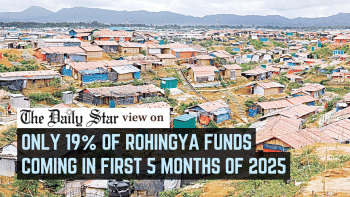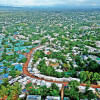Resolving the Rohingya crisis requires greater solidarity

It is encouraging to see the Rohingya crisis getting renewed attention following a three-day conference in Cox's Bazar that brought together global stakeholders and Rohingya representatives in part to prepare inputs for a high-level conference scheduled at the UN Headquarters next month. A salient feature of this event was a seven-point proposal forwarded by Chief Adviser Muhammad Yunus, which needs to be acknowledged for capturing the major talking points of this evolving crisis. For too long, the crisis has been met with either indifference or a passive, short-term approach. Yunus rightly reminds the world that the Rohingya people's "umbilical" bond with their homeland cannot be severed, and that their safe and dignified return must remain at the core of any solution.
His first proposal—creating a "practical roadmap" for repatriation—underscores this point, for without such a plan the crisis risks being trapped in perpetual rhetoric. His second proposal highlights the need for sustained international aid, with major funding gaps emerging in the Joint Response Plan for 2025-26, especially after US cuts. The third and fourth points relate to the cessation of violence in Rakhine, allowing internally displaced persons to safely return home, and the creation of a platform for dialogue among Myanmar's ethnic groups to ease tensions.
Equally important is his fifth point stressing greater involvement from ASEAN, neighbouring countries, and the international community in fostering peace and tackling cross-border crimes that destabilise the region. In this regard, he particularly mentions the ASEAN five-point consensus. In his sixth proposal, Yunus called on regional and global actors to stand firmly against ethnic cleansing and calibrate their relations with the Myanmar government, Arakan Army, and other armed groups accordingly. Finally, he placed justice and accountability at the heart of the solution, urging stronger international commitment to ongoing processes at the ICJ, ICC, and other forums. These seven pillars collectively outline a path towards both immediate relief and long-term resolution.
Going forward, we expect to see greater efforts on these fronts, especially from China which has the leverage to influence happenings in Myanmar and press for dialogue under ASEAN's five-point consensus. The fact is, as long as conflicts continue in Rakhine, the journey to desired outcomes, especially Rohingya refugees's repatriation, is unlikely to gain momentum. Even today, discriminatory policies like the 1982 Citizenship Law deny them basic rights. As Khalilur Rahman, the national security adviser and high representative for the Rohingya issue, has reiterated at the Cox's Bazar conference, Bangladesh submitted lists for approximately eight lakh Rohingya to Myanmar, which confirmed over 1,80,000 as eligible for return. But unless those root causes are addressed, not only will their return remain elusive but new challenges will complicate things further. Since early 2024, 1,50,000 more Rohingya have already arrived in Bangladesh following the surge in conflicts in Myanmar.
Bangladesh has done all it could so far, opening its borders to the refugees and carrying a burden far beyond its capacity. The refugees themselves have repeatedly voiced their yearning to go home. Regional and global leaders now must step up to ensure that this crisis is not allowed to being dragged on indefinitely.


 For all latest news, follow The Daily Star's Google News channel.
For all latest news, follow The Daily Star's Google News channel. 









Comments